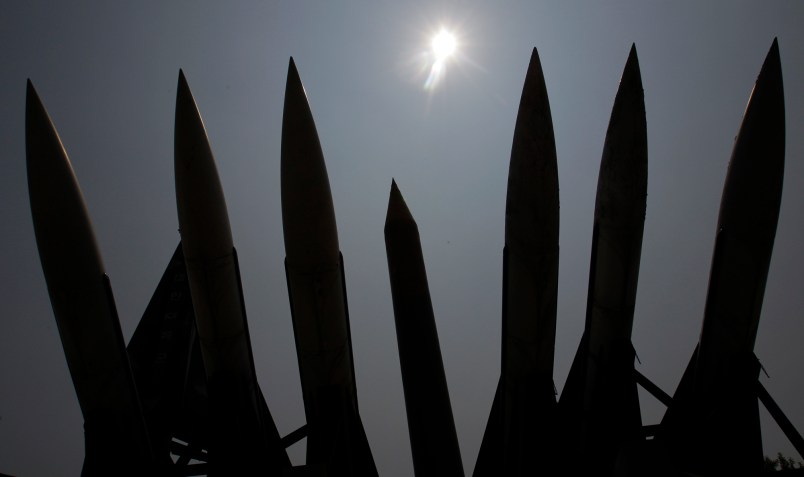TOKYO (AP) — Russia views U.S. missile defense systems being deployed in northeast Asia as a threat to regional security, Foreign Minister Sergey Lavrov said following talks Monday with Japanese officials in Tokyo.
Strategic concerns, both in northeast Asia and elsewhere, including Syria and Ukraine, were among a wide range of regional and global issues addressed in the one-day talks among foreign and defense ministers from Japan and Russia.
The two sides said they agreed to keep working toward resolving a longstanding territorial dispute that has prevented the countries from forging a peace treaty officially ending their World War II hostilities. They also joined in urging North Korea to refrain from “provocative actions” and to abide by United Nations resolutions demanding an end to its nuclear and missile testing.
The talks in Tokyo were the two countries’ first “two-plus-two” meeting of foreign and defense ministers since Russia’s annexation of Crimea from Ukraine.
Earlier this month, North Korea fired four missiles, of which three landed inside Japan’s territorial waters.
The U.S. and South Korea have agreed to install an advanced anti-missile system as a defense against North Korea. The Terminal High-Altitude Area Defense system, or THAAD, has angered both Russia and China. Russia also objects to U.S. missile defense systems in Japan.
“The U.S. global ballistic missile defense poses a deep risk to the security of the region,” Lavrov said. He said it was crucial to avoid upsetting the balance in the region and setting off an even greater arms buildup that could lead North Korea to step up its own military expansion.
Lavrov said the installation of the THAAD system was “a response completely out of proportion” to the threat from North Korea. He accused the U.S. of “pumping arms into the region.”
Lavrov also called for approaches that might encourage North Korea to engage in dialogue with its neighbors.
Lavrov met with Japanese Foreign Minister Fumio Kishida, and Russian Defense Minister Sergei Shoigu held talks with his Japanese counterpart, Tomomi Inada. The four ministers then held combined talks on international and bilateral issues.
Japan and Russia last held “two-plus-two” talks in November 2013. Meetings were shelved after that due to the crisis in Ukraine, as Japan joined sanctions against Moscow.
As expected, the Tokyo talks did not yield a breakthrough on conflicting Russian and Japanese claims to islands just north of Japan’s northernmost main island of Hokkaido — Etorofu, Kunashiri, Shikotan and the Habomai islets — that came under Russian control in the closing weeks of World War II.
But the countries discussed possible visa-free travel between Hokkaido and the area. They also are working toward joint development of fisheries, tourism and other areas that might help bridge the gap.
“I believe this joint development will become an important step to create an appropriate environment for resolving a peace treaty,” Lavrov told reporters.
Russia has been eager to enlist Japanese help with development of energy and other industries in its Far East.
But while Monday’s talks yielded an agreement to keep talking, Japan has concerns over Russia’s installment of surface-to-ship missiles on Etorofu and other military activity elsewhere on the disputed islands.
The territorial issue has lingered since World War II, but disputes between Japan and Russia date back much further, to the 19th century, when the Russian and Japanese empires fought for domination of northeastern China, then known as Manchuria, and the Korean Peninsula.
Japan’s victory in the 1904-05 Russo-Japanese war hobbled Russia’s expansion in the Far East and was the first significant triumph of an Asian country over a European nation. A treaty brokered by the U.S. enabled Tokyo to claim territories that were later regained by Moscow after Japan’s World War II defeat in 1945.
___
Associated Press journalists Howard Amos in Moscow and Emily Wang and Kaori Hitomi in Tokyo contributed to this report.
Copyright 2017 The Associated Press. All rights reserved. This material may not be published, broadcast, rewritten or redistributed.







Then do something about it.